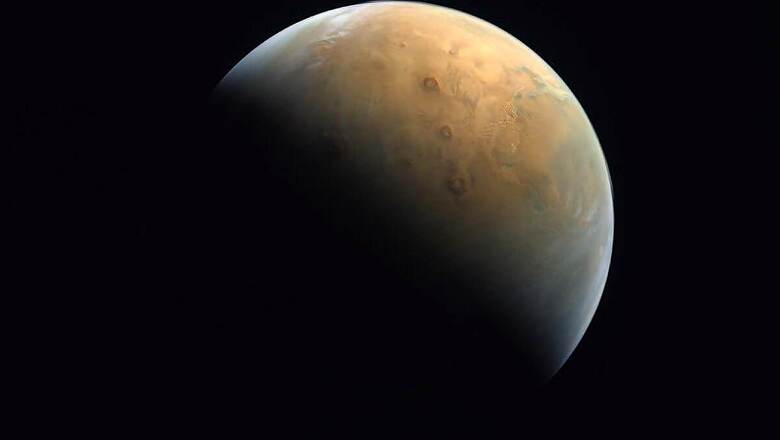
views
A first photograph of the Mars surface was sent home by the United Arab Emirates probe, Hope, showing, among other features, Olympus Mons – the largest known volcano of our solar system. The image was sent to Earth by Hope on Wednesday, February 10, after it entered the Martian orbit a day before. The probe was at a height of almost 25,000 kilometres above the Martian surface, when it captured the volcano breaking out into a Martian sunrise. Hope is the first Arab probe in history, and among scientific observations, is stated to aim to excite the younger generation in UAE in space exploration projects.
Olympus Mons is the biggest surface blister of its kind in Earth’s vicinity. It is the largest volcano in our solar system, and the second-largest mountain across the entire set of planets and their satellites. The volcano is situation in a volcanic patch on the Martian surface that contains 12 volcanoes – Olympus Mons included. The volcanic mountain is approximately 25 kilometres tall, or almost three times the height of Mount Everest – Earth’s tallest peak. The volcano’s crater spans 80km at its mouth, making it roughly 100x larger than Earth’s biggest volcano – Mauna Loa.
من ارتفاع ٢٥ ألف كم عن سطح الكوكب الأحمر .. أول صورة للمريخ بأول مسبار عربي في التاريخ The first picture of Mars captured by the first-ever Arab probe in history, 25,000 km above the Red Planet's surface pic.twitter.com/Qgh2Cn3JPF
— HH Sheikh Mohammed (@HHShkMohd) February 14, 2021
Marking the feat, UAE prime minister and Dubai crown prince Sheikh Mohammed bin Rashid Al-Maktoum tweeted the photo sent home by the UAE Hope probe. The latter happens to be the first of three Mars probes that entered the planet’s orbit in the recent months, alongside USA and China as well. The Hope probe carries onboard three key scientific instruments, which have been tuned to study the Martian weather and capture fine data points about the weather conditions and influences on Mars.
The photo sent home by Hope shows the volcanic patch featuring Olympus Mons, in the gradually sunlit upper hemisphere of Mars. Earth’s nearest neighbour has also been a strong candidate for having supported life at some point of time in its past, which has made it a strong area of focus for space missions across the world.
Read all the Latest News, Breaking News and Coronavirus News here




















Comments
0 comment